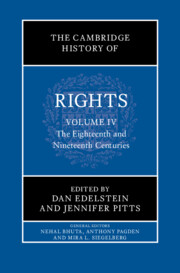Book contents
- the cambridge history of rights
- The Cambridge History of Rights
- The Cambridge History of Rights
- Copyright page
- Contents
- Figures
- Contributors to Volume IV
- General Introduction
- A Note on Translations
- Introduction to Volume IV
- Part I A Revolution in Rights?
- Part II Postrevolutionary Rights
- Part III Rights and Empires
- 18 Rights and Empires
- 19 Rights in Late Mughal and Early Colonial India
- 20 Rights in the Americas
- 21 The Free Sea
- 22 Abolition and Imperialism in Africa
- 23 Rights in Pan-Asian, Pan-Islamic, and Pan-African Thought
- 24 Indigenous Rights in Settler Colonies
- 25 Catholicism and Rights
- 26 (Human) Rights Associations (1775–1898)
- Index
- References
23 - Rights in Pan-Asian, Pan-Islamic, and Pan-African Thought
from Part III - Rights and Empires
Published online by Cambridge University Press: 22 January 2025
- the cambridge history of rights
- The Cambridge History of Rights
- The Cambridge History of Rights
- Copyright page
- Contents
- Figures
- Contributors to Volume IV
- General Introduction
- A Note on Translations
- Introduction to Volume IV
- Part I A Revolution in Rights?
- Part II Postrevolutionary Rights
- Part III Rights and Empires
- 18 Rights and Empires
- 19 Rights in Late Mughal and Early Colonial India
- 20 Rights in the Americas
- 21 The Free Sea
- 22 Abolition and Imperialism in Africa
- 23 Rights in Pan-Asian, Pan-Islamic, and Pan-African Thought
- 24 Indigenous Rights in Settler Colonies
- 25 Catholicism and Rights
- 26 (Human) Rights Associations (1775–1898)
- Index
- References
Summary
This chapter focuses on the Pan-Asian, Pan-African, and Pan-Islamic notions of rights from the 1870s to the 1920s to explore why and how Asian and African intellectuals substantiated their appeals to equal rights through pan-nationalistic language about the civility of their race, religion, and culture in relation to the white and Christian populations of the European metropoles. It argues that mobilization among Pan-Islamists, Pan-Asianists, and Pan-Africanists in the immediate aftermath of World War I, in which rights claims played a central role, represented the culmination of longer intellectual developments centered on the foundational claims of racial equality and civilizational capacity during the previous half a century. Pan-nationalist formulation of counternarratives of race and civilization to substantiate their demands for rights either within the European empires that ruled over them, or in international law on behalf of all the non-European empires and kingdoms, started as apologetic attempts of many non-European intellectuals to raise the level of civilization in their societies through self-strengthening reforms in order to claim an equal and dignified place in the globalizing imperial world. Gradually, however, pan-nationalist claims began to include a more confident assertion that Asian and African societies had their own innate civilizational capacities that needs to be revived and they have a right to equality irrespective of their racial, civilizational, and religious differences. The chapter suggests that pan-nationalist intellectual efforts greatly contributed to the foundations of the nationalist claims to the right to self-determination in Asia and Africa that culminated in the post–World War II period decolonization.
- Type
- Chapter
- Information
- The Cambridge History of Rights , pp. 544 - 564Publisher: Cambridge University PressPrint publication year: 2024

